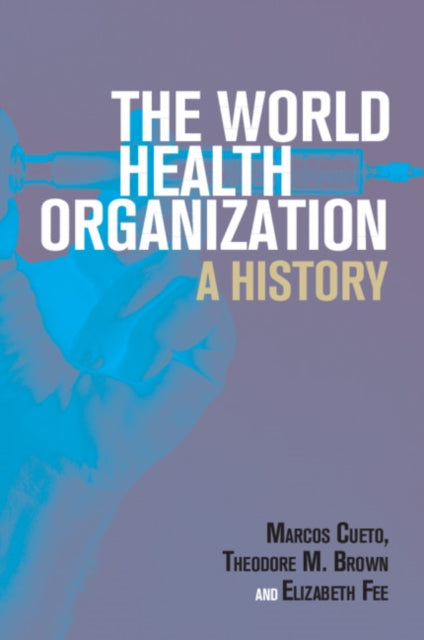Marcos Cueto,Theodore M.Brown,Elizabeth Fee
World Health Organization: A History
World Health Organization: A History
YOU SAVE £1.49
- Condition: Brand new
- UK Delivery times: Usually arrives within 2 - 3 working days
- UK Shipping: Fee starts at £2.39. Subject to product weight & dimension
Bulk ordering. Want 15 or more copies? Get a personalised quote and bigger discounts. Learn more about bulk orders.
Couldn't load pickup availability
- More about World Health Organization: A History
The World Health Organization (WHO) was founded in 1946 with the mission of achieving the highest possible level of health for all people, regardless of race, religion, political belief, economic status, or social condition. This new history explores the WHO's origins, institutional antecedents, and contemporary and future roles, examining how it was shaped by the postwar period, the Cold War, and the relative influence of the US and other approaches to healthcare. It re-evaluates the success and failure of critical WHO campaigns, from early malaria and smallpox eradication programs to struggles with Ebola today.
Format: Paperback / softback
Length: 388 pages
Publication date: 11 April 2019
Publisher: Cambridge University Press
The World Health Organization (WHO) is an international organization established by the United Nations in 1948 with the noble mission of achieving the highest possible level of health for all people, regardless of their race, religion, political belief, economic status, or social condition. Since its inception, the WHO has played a crucial role in promoting global health and fighting various diseases and epidemics.
However, the question of how effectively the WHO has pursued its mission since 1946 has been a subject of debate. This comprehensive and engaging new history delves into these questions by examining the organization's origins, institutional antecedents, and its contemporary and future roles. It explores how the WHO was shaped by the postwar period, the Cold War, the relative influence of the United States and other healthcare approaches, and its position alongside other international bodies such as UNICEF, the World Bank, and the Gates Foundation.
The authors of this history re-evaluate the relative success and failure of critical WHO campaigns, ranging from early malaria and smallpox eradication programs to the ongoing struggle against Ebola today. They analyze the factors that contributed to these campaigns' successes and challenges, including the involvement of governments, international organizations, and private sector partners.
One of the key themes of the history is the evolution of the WHO's mandate and its response to emerging health threats. The organization has faced numerous challenges throughout its history, from the global spread of diseases such as HIV/AIDS, Ebola, and COVID-19 to natural disasters and political instability.
The history also highlights the importance of collaboration and partnership in achieving global health goals. The WHO has worked closely with various stakeholders, including governments, international organizations, civil society groups, and the private sector, to develop and implement effective health policies and programs.
Another important aspect of the history is the role of the WHO in promoting health equity and reducing social and economic inequalities. The organization has recognized that health is not just a matter of individual well-being but also a social and economic issue that affects entire communities.
The history also explores the impact of the WHO's work on global health outcomes. While the organization has made significant progress in improving health outcomes, there are still gaps in access to healthcare, particularly in low- and middle-income countries.
In conclusion, this comprehensive and engaging new history provides a valuable insight into the World Health Organization's mission, history, and contemporary challenges. It sheds light on the organization's successes and failures, the factors that have shaped its work, and the importance of collaboration and partnership in achieving global health goals. The history is a valuable resource for policymakers, healthcare professionals, and anyone interested in promoting global health and reducing social and economic inequalities.
Weight: 634g
Dimension: 154 x 228 x 19 (mm)
ISBN-13: 9781108728843
This item can be found in:
UK and International shipping information
UK and International shipping information
UK Delivery and returns information:
- Delivery within 2 - 3 days when ordering in the UK.
- Shipping fee for UK customers from £2.39. Fully tracked shipping service available.
- Returns policy: Return within 30 days of receipt for full refund.
International deliveries:
Shulph Ink now ships to Australia, Belgium, Canada, France, Germany, Ireland, Italy, India, Luxembourg Saudi Arabia, Singapore, Spain, Netherlands, New Zealand, United Arab Emirates, United States of America.
- Delivery times: within 5 - 10 days for international orders.
- Shipping fee: charges vary for overseas orders. Only tracked services are available for most international orders. Some countries have untracked shipping options.
- Customs charges: If ordering to addresses outside the United Kingdom, you may or may not incur additional customs and duties fees during local delivery.


